LATEST NEWS


Calling on California’s leaders to invest in their state, the California Labor Federation (CLF) today unveiled an ambitious plan to pull the state out of its economic slump.
The seven-point plan begins by urging construction of the long-planned, oft-fought high-speed railway line that would connect San Diego, Sacramento and the Bay Area. Only a few years ago this seemed like a staggering but plausible infrastructure project – a magic bullet train, as it were, that would create thousands of good, lasting jobs. But when the recession hit, it stalled – and since then territorial politics have stopped the project in its tracks, along with some new cost projections for a much higher than expected construction price tag. The CLF plan asks legislators to begin releasing money from Prop 1A bonds that were passed by voters in 2008.
The CLF plan’s other planks include the following:
» Read more about: Calif. Unions Push for Jobs, Push Back on Pensions »


I raise money for LAANE, the Los Angeles Alliance for a New Economy. Asking other people for money isn’t something most people are comfortable with, but I do it every day because it’s the way I serve, how I heal the world. It’s the thing I can do, and I couldn’t look into the faces of people struggling in my community and say, “Sorry, it felt weird to ask for a check.” But I often wonder, “Who gives and why?”
A lot depends on knowing the answer to that question, and the truth is we don’t always have one. We know that people give because they are asked. If you don’t ask, you don’t get. But we get turned down a lot even when we do ask. Sometimes our cause just doesn’t resonate with the donor, and that’s okay. But sometimes – a lot of the time, most of the time – a donor is a donor because they have some spark in them that demands they give back.

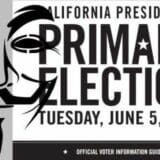
We’re thoroughly non-partisan here at Frying Pan News, but still we get many questions about voting. Most of them are about American Idol, but once in a while someone wants to know about elected officials. And while we still won’t tell you how to vote (though Professor Wagstaff’s dictum isn’t a bad place to start), we can happily answer some of your process questions.
Q: Hey, I heard a lot recently about voters “making mischief” in the presidential primary in Michigan. ’Sup with that?
A: It’s true—at least it’s true that you heard a lot about it, though there’s little evidence of any actual mischief-making. But some states do allow (just about) anyone to vote in (just about) any primary. In Michigan, the story goes, some Democrats – convinced that Romney would be the stronger opponent in the fall – crossed party lines to vote for Santorum in the primary,
» Read more about: Making Mischief in California Primaries »


By Johnny 5 Hanrahan
I, along with 30 other talented, hardworking crew members, was fired recently from a successful, internationally popular TV show called 1000 Ways to Die. Our crime: Trying to unionize. Joining the union would allow us to have health insurance — something that is not asking for too much, especially from a hit show. It is easy to take advantage of a reality TV crew in this economy, especially for low-ball rates, by having members work 70-plus hour weeks on their feet, as they make nearly minimum wage in a non-union atmosphere. We wanted the opportunity to live the better, healthier lives which we deserve; hence we contacted unions to help us with that. “Together we are what we cannot be alone. United we stand, divided we fall.”
Reps from the Teamsters and IATSE (International Alliance of Theatrical Stage Employees) came to the set on our behalf —
» Read more about: Reality TV Bites: “Blue Collar” Show Fires Its Workers »


By Kate Sheppard
(This post originally appeared on Mother Jones .)
Climate Central has released a new in-depth report on the combined impacts of rising seas and storm surges. With rising water levels, more people and property are at risk—especially during storms, which force water farther inland. Here’s an excerpt from the executive summary:
Global warming has raised sea level about eight inches since 1880, and the rate of rise is accelerating. Scientists expect 20 to 80 more inches this century, a lot depending upon how much more heat-trapping pollution humanity puts into the sky. This study makes mid-range projections of 1 to 8 inches by 2030, and 4 to 19 inches by 2050, depending upon location across the contiguous 48 states.
Rising seas dramatically increase the odds of damaging floods from storm surges. For more than two-thirds of the locations analyzed (and for 85% of sites outside the Gulf of Mexico),
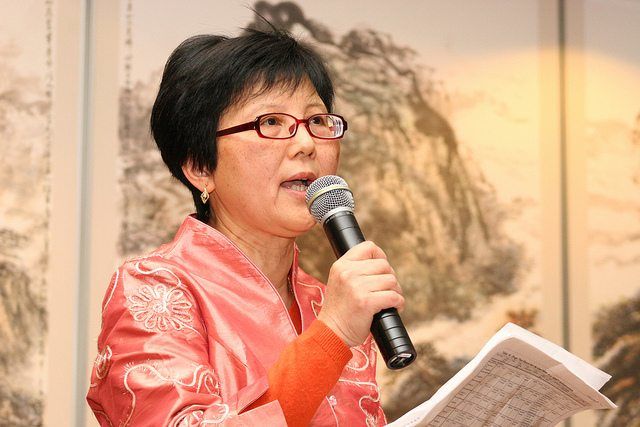

By Julie Chow
In a soon-to-be released report, the UCLA Center for Health Policy Research states, “Paid caregivers caring for recipients of Medi-Cal fare the worst in monthly income, job stability, home ownership, health insurance coverage, delays in obtaining medical care and food security. Data from the 2009 California Health Interview Survey suggest that paid Medi-Cal caregivers face hidden costs and are at risk for continued economic uncertainty.”
As a caregiver for over 10 years, and as part of my union’s Los Angeles contract committee, I can tell you that the statement above is more than accurate. We’ve heard from hundreds of our caregivers — their top concerns are job/wage security and access to quality health care. So, as we continue to negotiate with Los Angeles County, these are two of our top priorities.
We recognize that this economy has affected more than just ourselves; we see it in our neighbors,


Most of us – at least the 87 percent or so of us not protected by collective bargaining agreements – have to worry about job security. With only a few exceptions, all of us can be fired for any reason – or for no reason at all.
Two California news “scandals” brought this into sharp relief this week, as a couple of public employees found themselves under fire for some extracurricular activities.
In one case, Daniel Richards, president of the state Fish and Game Commission, shot and killed a mountain lion during a hunting trip in Idaho. In another case, some students discovered that Oxnard middle school teacher Stacie Halas had shot a porn video. Both are facing some degree of popular outrage, and calls for their dismissals.
First things first: No one has yet alleged that either of these two has violated any laws.
» Read more about: Hunting and Porn: Job Security in California »


You may have already heard that uber-retailer Walmart plans to open a 33,000 square-foot store in L.A.’s Chinatown.
Last week opponents of Walmart’s Chinatown store gathered at Sixth and Park View in MacArthur Park to listen to Walmart “associates”—the retailer’s preferred term for its employees—talk about their need for public assistance to make ends meet.
If you know L.A., you know MacArthur Park is nowhere near Chinatown. But it is across the street from a California Department of Public Social Services (DPSS) building—a place you’d go to apply for social services such as welfare and health care— for support you might need if you were employed at a poverty-wage job.
Support you might need if you work at Walmart.
There have been scores of news stories over the years about Walmart and the low job standards that rendered much of its workforce eligible for Medicaid.


This weekend I was visiting one of the many free museums in Washington, D.C. (a perk of living in this city) and found an incredible poster at the National Museum of American History. Weimer Pursell’s color illustration depicted a well-dressed man behind the wheel of a 1940s convertible — with the ghostly outline of the Führer sitting next to him; it implored Americans to save gas during World War II by joining a car pool.
“When You Ride Alone You Ride With Hitler!” the letters scream. It is one of the war’s most famous posters and, while it has been copied and parodied since then, its message of national sacrifice resonates to this day.
Imagine that: During World War II Americans were told that riding alone in a car was like riding with Hitler. Saving and conserving, and helping others, was lifted up — in this and many other posters —
We drove north out of Santa Fe, through Espanola and past Abiquiu, the village where the artist Georgia O’Keefe lived, until we reached a narrow road in the high country. Then we drove until we came to a dirt and gravel road that led another 10 miles to a small cluster of houses and buildings named Ganado, the Spanish word for “cattle.” My wife, Susan, would live for a week at an encampment with a hundred other women, creating rituals and raising consciousness — while I headed back to Santa Fe with a stack of books.
But when I picked her up, she was not happy. The conference had been great, and the women amazing, but the noise had kept her mostly awake day and night. Just over the hillock someone was digging for natural gas, and by day the trucks rolled through and the drilling machines whined, and by night the pumps roared and the pipes rattled.


Not long ago, I wrote about how the goods-movement industry uses threats about the Panama Canal to try to keep costs low on the West Coast docks. “Diversion!” they shout. It’s a not-too-subtle threat to move cargo from the West Coast – where wages and environmental standards are high – to the East Coast.
Well, try not to get whiplash from the latest warning cries from these same folks. According to leading trade publication The Journal of Commerce, an executive from a shipping line is now warning of possible cargo diversion—from east to west! The International Longshoremen’s Association represents dock workers on the East and Gulf Coasts, and they’re currently negotiating a new contract. Making the bosses nervous is the fact that the ILA has a new, tough-talking leader.
The JOC reports: “David Arsenault, vice president of Hyundai Merchant Marine,
» Read more about: Shippers’ Panama Canal Threat: Real or Bluff? »


The Pentagon’s defiant pledge to stick with the Rush Limbaugh show, no matter what, bumps up against a few hard and insulting realities. The Armed Forces Network that carries the Limbaugh show is not a private business, corporation, or proprietorship that can do whatever it pleases with its money, personnel, operations and policy. Every penny of the armed forces bloated budget comes from taxpayers. The Armed Forces Network, which has beamed the Limbaugh show for two decades, is oiled to the tune of an estimated $27 million annually. Every penny of which comes from the pockets of taxpayers. And since the military is not a democracy, and decisions are made top down, there was never any chance that taxpayers would have any say about the use of their money to subsidize the naked bias of one radio jock at public expense.
The same rule applies to those in the military that have had Limbaugh shoved down their listening palate.
» Read more about: What Budget Cuts? Tax Dollars Promote Rush Limbaugh’s Show »
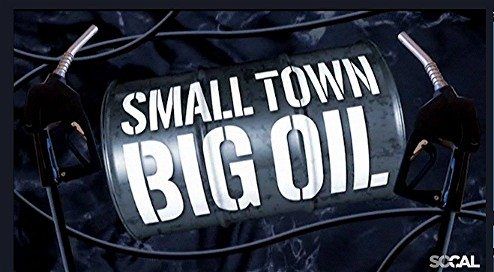

Last week KCET television broadcast “Small Town, Big Oil,” an examination of Chevron Oil’s influence on the L.A. County beach town of El Segundo. The station’s SoCal Connected show featured an interview by correspondent Vince Gonzales with Frying Pan News writer Donald Cohen, who had written about the recent Chevron controversy, in which El Segundo’s city manager, Doug Willmore, was fired for suggesting the petroleum giant pay a level of local taxes on par with other California refineries. Cohen is also the director of the Cry Wolf Project.
Click here for the full transcript. Here is a sample:
Gonzales: What is the message coming out of city government?
Donald Cohen/Director, Cry Wolf Project: The message is that Chevron is the sheriff. They are in control. They ought to be ashamed of themselves and so should the members of the Council who voted to fire the city manager.
» Read more about: Frying Pan Writer on KCET's Chevron Exposé »


International Women’s Day has been observed since the early 1900s, a time of great expansion and turbulence in the industrialized world that saw booming population growth and the rise of radical ideologies. While we have made great strides for women’s rights in the home, community and workplace over the past century, we still have a long way to go.
But does simply marking the day do much for women’s lives? Not really. We need to engage community leaders and push our decision-makers to enact policies that ensure we’re constantly moving forward.
In Los Angeles, we have many sectors that employ a large percentage of women, including the hospitality industry. These women work daily to ensure that the 27 million visitors who visit our city annually have a great experience. They make sure the rooms are spotless, the beds are made perfectly and guests are greeted warmly.
Judging by the numbers,
» Read more about: The Inhospitable World of L.A.’s Female Tourism Workers »
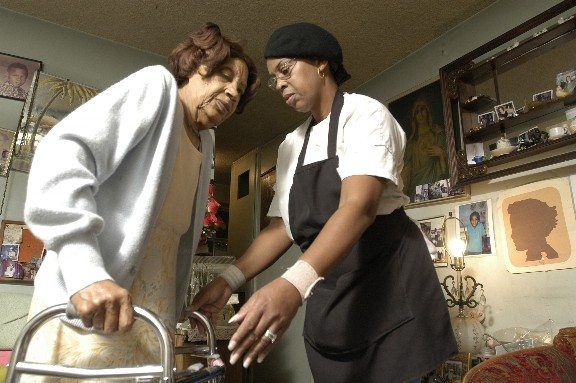

By Michele Reed
I am an in-home care worker and vice president of a union called United Long Term Care Workers (ULTCW), which is a member of the Service Employees International Union. Currently, I and over 120,000 other in-home caregivers are negotiating with Los Angeles County to win a living wage and better future for home-care workers. As testimony to the need for a living wage, here is my story.
Just over 19 years ago, I started taking care of my grandmother. She already had a home-care worker but I would help with errands, help around the house and just thought to myself that after all she had done for me, this was the least I could do for her. From the moment I started taking care of her, I knew that home care was my calling.
Growing up, I was an only child and my mother was an only child too.
» Read more about: A Living Wage: Making a Difference for Caregivers »
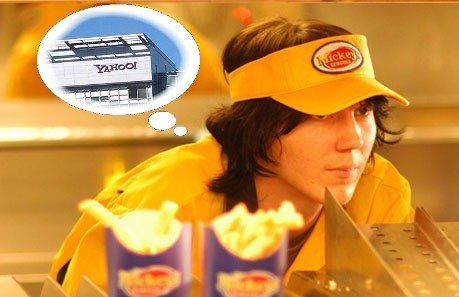

During his 20-year career as a journalist, Rick Wartzman delved deep into the reality of poverty for a major Wall Street Journal examination of the minimum wage and also mastered the intricacies of corporate finance as business editor of the L.A. Times. In yesterday’s interview with Frying Pan News, the executive director of the Drucker Institute discussed the destructive force of big business’ “shareholder-is-all culture.” In today’s conclusion, Wartzman talks about Walmart, the outlook for unions and the need to build an education-based service economy.
Frying Pan News: How would you characterize Walmart, which is now trying to move into L.A.’s grocery market?
Rick Wartzman: Walmart is less Drucker-like than Costco, certainly, but increasingly presents a complicated picture. They’ve always paid lousy wages and benefits, squeezed suppliers until they choked and accelerated the race to the bottom in terms of low-cost labor.
» Read more about: Interview: Rick Wartzman on Greed and Conscious Capitalism, Part 2 »
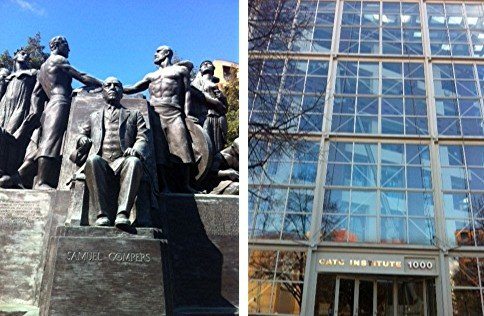

What do 19th century labor leader Samuel Gompers and the virulently anti-union think tank, the Cato Institute, have in common? More than you might imagine. They actually stare out at each other across Massachusetts Avenue in Washington, D.C. Or rather, the beautiful monument of Gompers and Gompers Square sit directly opposite Cato’s towering, modern offices, where the Koch brothers regularly plot strategy.
I discovered this humorous anomaly while moving into my temporary apartment around the corner, on 11th Street and Massachusetts Avenue, as I prepared to begin a three-month fellowship at Georgetown University — and a project that will look at ways to link to federal policy our efforts to build a new economy for all in Los Angeles. More on that later.
In memory of Gompers, I decided to create an imagined dialogue between the Cato Institute — now embroiled in an internal brouhaha involving the Brothers Koch – and their ever present bronze nemesis,


Few can claim as much knowledge of both sides of America’s polarized wealth divide as Rick Wartzman. During his 20-year career as a journalist, Wartzman delved deep into the reality of poverty for a major Wall Street Journal examination of the minimum wage and also mastered the intricacies of corporate finance as business editor of the L.A. Times. At the Times he also originated one of the paper’s only serious attempts at understanding the real economic challenges of our time, a column that the Times soon jettisoned, making clear that covering the lives of the working class — truck drivers, hotel workers, factory hands — was not a priority.
Since 2007 Wartzman has served as executive director of the Drucker Institute, a think tank founded to perpetuate the legacy of management guru Peter Drucker and dedicated to bettering society by helping organizations to be more effective and responsible.
» Read more about: Drucker Institute’s Rick Wartzman on Greed and Conscious Capitalism »


Since when did one’s mode of transportation become about politics? Who ever thought that riding one’s bike to the grocery store, taking the bus to work or driving to run errands could be a sign of one’s political stripes?
In some cities, such as New York and San Francisco, riding the train defines the experience of everyone living there. Entire movies, books and blogs have documented the romance and day-to-day life of riding public transit and navigating busy sidewalks. Can you even imagine what a New York free of subways, buses and pedestrians would look like? Republican or Democrat, liberal or conservative, you’re on the train.
Just ask Mitt.
Mitt Romney is among a vocal set of Republicans who have decided that certain forms of transportation are more democratic than others; he subscribes to the belief that roads are a given right of Americans, but that public transit is not.
» Read more about: Highway Robbery: Mitt Romney’s War on Mass Transit »


Happy Birthday, Walmart! You great big mega-marketing rascal–you turn 50 this week. You’ve come such a long way from Roger, Arkansas, the tiny town at the foot of the Ozarks where you took your first wobbly steps.
Now you’re an international star! The planet’s biggest private-sector employer, with 2.2 million “associates” throughout the world—we usually call ‘em employees, but whatever– 1.4 million in the United States. Creator of history’s most efficient global supply chain, you call the shots on production, wage and workplace standards around the world—the Walmart business model ruthlessly undercut those everywhere. Plus you have shriveled and destroyed small business communities in towns across the United States.
Star power, dudes.
Now you are here in Los Angeles celebrating the big Five Oh with a new acquisition.
It’s tasteful, not large and gaudy, like your typical 200,000 square foot megastore.
» Read more about: Grand Illusion: Walmart's Birthday "Gift" to Chinatown »